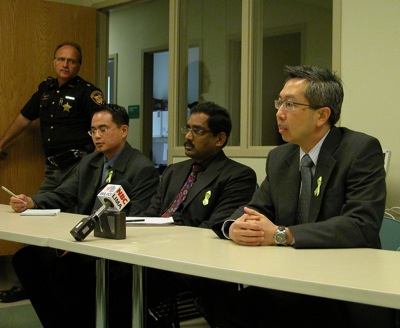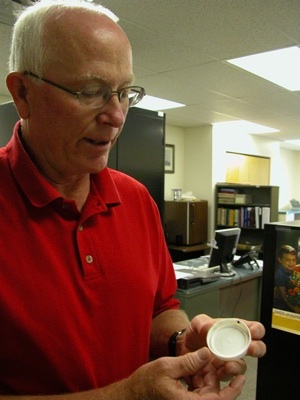Wednesday, May 9th, 2007
Singapore delegation studies rehabilitation program
By Shelley Grieshop

Photo by Shelley Grieshop/The Daily Standard
Representatives of the prison system in Singapore answer questions from media representatives prior to a tour they took of the Auglaize County Law Enforcement Center on Tuesday. The delegation spent several hours at the center gathering information about the sheriff office's nationally-recognized offender re-entry program. From left are Teo Tze Fang, assistant director of operations of the Singapore Prisons Department; Achuthappa, community and vocational rehabilitation division manager of Singapore Corporation of Rehabilitative Enterprises; and Tan Eng Keong, head of operations of Sembawang Drug Rehabilitation Centre.
WAPAKONETA - A group of Singapore officials traveled to Auglaize County on Tuesday morning to study a state-recognized program that helps inmates successfully fit back into society.
The delegation to the Auglaize County Law Enforcement Center consisted of four English-speaking representatives of Singapore's prison system who were invited to the United States by PowerNet of Dayton, a nonprofit grassroots organization that works within communities to bridge the gap for ex-offender re-entry programs.
The Singapore prison officials chose to tour the Auglaize County facility in Wapakoneta after hearing about its Auglaize County Transition (ACT) program, implemented at the 72-bed jail in January 2003. It is just one of six such programs currently operating in the United States.
"We heard Ohio was the leader in re-entry programs, and we've visited a lot of re-entry programs in Ohio recently," said Teo Tze Fang, assistant director of operations of the Singapore Prisons Department. "It is true. We are very impressed with what you have."
The prison system in Singapore has undergone its own successful transformation in recent years with The Yellow Ribbon Project, which was launched in 2004 to give communities a better understanding of how difficult it is for offenders to re-enter society, Fang said during a press conference at the Auglaize County center.
Fang explained the name of their program is based on the popular song that topped the billboards in the '70s, "Tie a Yellow Ribbon Round the Ole Oak Tree," about an inmate's hope of finding forgiveness from the one he loves upon prison release.
All of the Singapore officials wore yellow ribbons on their suit jackets on Tuesday as they toured the jail and spoke with numerous staff members involved with the ACT program.
Singapore, with a population of nearly 4.5 million people, has 13 prisons with an estimated 11,000 offenders released each year. The country boasts a steadily decreasing crime rate that fell by 10 percent from 2005 to 2006, according to Singapore Police statistics.
Fang stressed that it's not only the offender who must deal with society, it is often their families who are shunned by the community, too. The Yellow Ribbon project offers both a new chance at life, he said.
"It's been successful at giving ex-offenders hope. Everyone needs hope to carry on with life. They need chances to get work and go back to their families," Fang said.
Craig Powell of PowerNet, acting as liaison for the delegates, explained how officials in Singapore raised more than $1 million for their Yellow Ribbon campaign, which disbursed $329,000 in 2005 to nine agencies and helped 1,570 offenders. Powell said he believes rehabilitation programs like Singapore's and ACT also will reduce prison crowding and budgets.
"In 2004, the president (Bush) declared offender re-entry programs an important issue because of the money it could save," Powell said.
The delegation toured several prisons and halfway houses on their weeklong tour in the United States, which ends today.
Auglaize County Sheriff Al Solomon was somewhat humbled the delegates chose his department to visit, although he is proud of the success of the ACT program and its staff.
He also noted how impressed he was with the amount of money Singapore officials raised for their Yellow Ribbon program.
"We'd be hard-pressed to do that here," he said.


